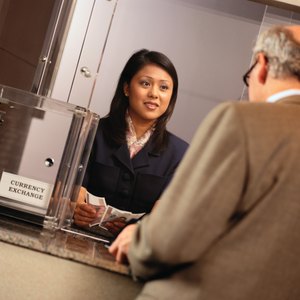
Foreign currency fees are an expense that many travelers overlook. While some businesses overseas may accept dollars as payment, many will require local currency. To convert from dollars to another currency, you'll often have to pay a fee, sometimes reaching 3 percent or more. You may also be victimized by a poor exchange rate, depending on the financial services institution you use. By planning ahead, you may be able to minimize or even eliminate your foreign currency conversion fees. You may even be able to sidestep foreign currency exchange altogether by using a credit card, although certain cards do charge fees.
Visit your bank before you leave the country. Most banks won't charge a fee to convert your U.S. dollars into a major foreign currency. Some won't charge fees for any currency conversion. You'll generally receive a better rate at international banks than at independent money changers, and you can usually avoid a conversion fee. However, you should check the rate your bank offers first. Sometimes, banks offer better exchange rates via automated teller machines and credit cards than through a straight currency purchase.
Use a fee-free automated teller machine in your destination country. Typically, you'll receive local currency at the current market rate, and you won't be charged any currency conversion fee. In some cases, the local ATM may charge you for a withdrawal, but if you search, you may be able to find machines that are totally fee-free. You may also be able to get a fee reimbursement from your bank if you ask. Some accounts come with that feature already included.
Get a credit card with no foreign transaction fees. In addition to paying fees on exchanging money, you're also likely to get hit with foreign transaction fees if you put an overseas purchase on a credit card. In most cases, this fee runs from 2 to 4 percent. Some cards offer no foreign transaction fees as a benefit to cardholders, and this is the type of card you want to use when overseas.
Pay in local currency. When you make a foreign purchase, some merchants may offer to let you pay in dollars rather than the local currency. If you choose to pay in dollars, the merchant's bank will perform the foreign exchange on your behalf, often charging you a significant fee in the form of a poor exchange rate. You may end up paying an additional 3 to 7 percent. Always choose to pay in the local currency so your own bank can do the conversion for you. You'll make the exchange at the current market rates, typically without any additional fee.
Get paid in foreign currency. If you work overseas, or if your employer has the capability, ask to be paid in local currency. You'll avoid the conversion issue altogether, as you'll always have a ready stream of foreign money.
References
- Bankrate.com: How to Avoid Foreign Transaction Fees
- Bank of America: How to Pay When You're Traveling Abroad
- Chase: No Foreign Transaction Fees Credit Cards
- OFX. "What Is an International Transaction Fee?" Accessed Oct. 27, 2020.
- Bureau Européen des Unions de Consommateurs. "Dynamic Currency Conversions: When Paying Abroad Costs You More Than It Should," Page 2. Accessed Oct. 27, 2020.
- XE. "XE Currency Converter." Accessed Oct. 27, 2020.
- American Express. "Do I Have to Pay Foreign Transaction Fees When I Use My Card?" Accessed Oct. 27, 2020.
- CreditCards.com. "2019 Credit Card Fee Survey: Premium rewards, card missteps get costlier." Accessed Oct. 27, 2020.
Writer Bio
John Csiszar earned a Certified Financial Planner designation and served for 18 years as an investment counselor before becoming a writing and editing contractor for various private clients. In addition to writing thousands of articles for various online publications, he has published five educational books for young adults.
